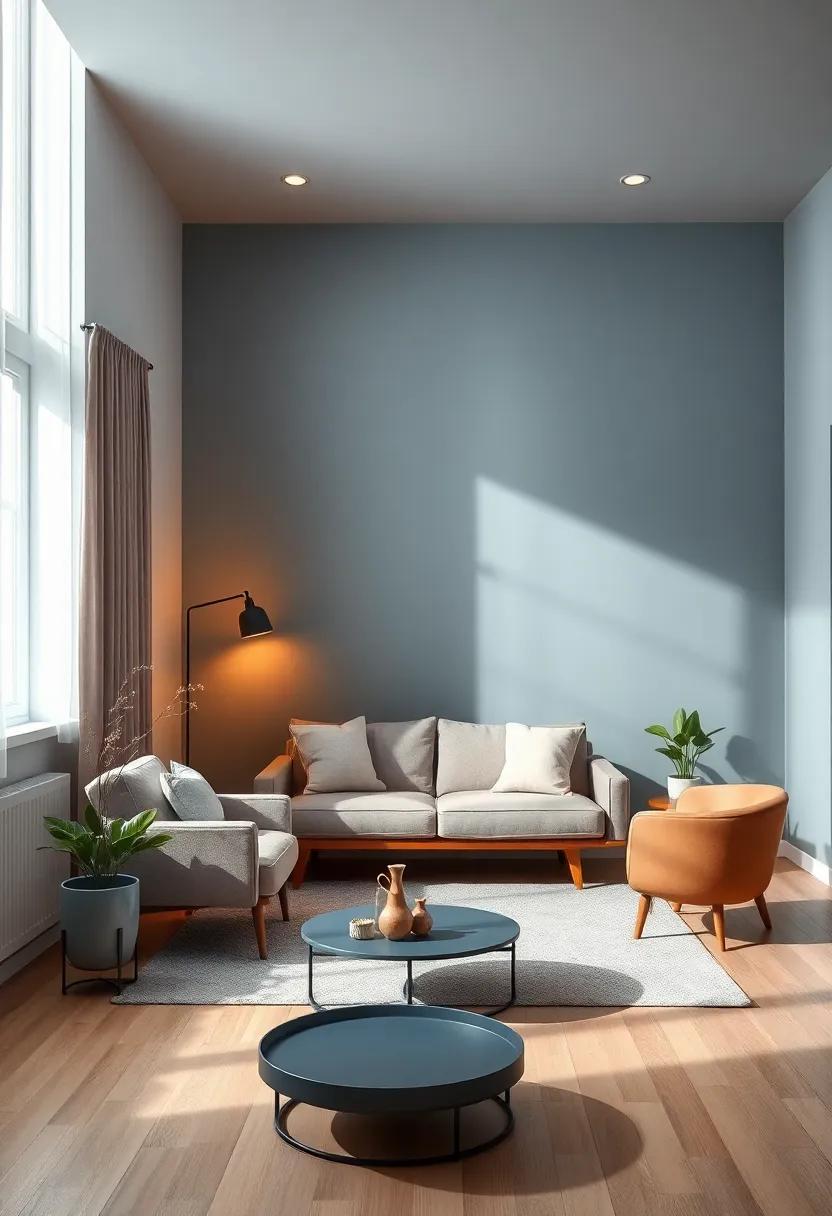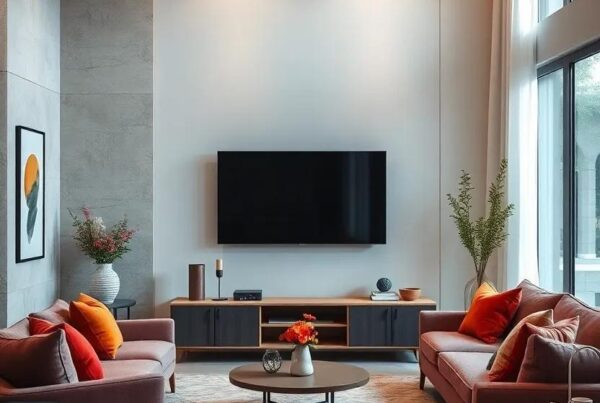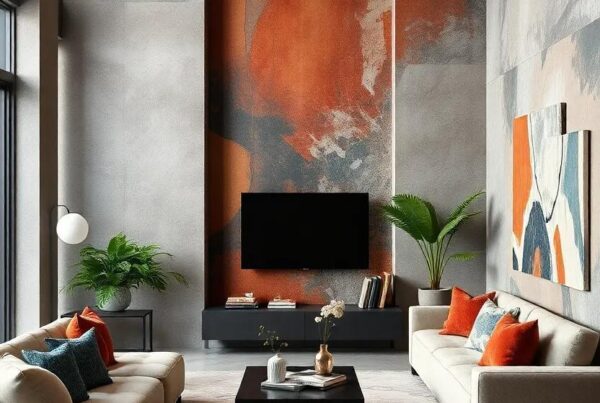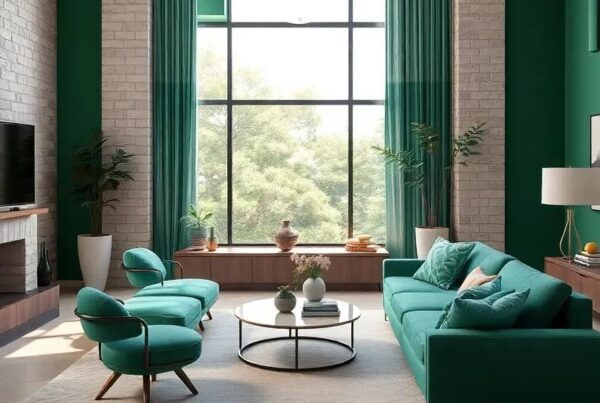In an era where space is often at a premium, the notion of transforming small living areas into havens of comfort adn style has never been more pertinent. The minimalist movement, with its emphasis on simplicity and functionality, offers a refreshing approach to this challenge. By embracing a carefully curated color scheme, even the coziest corners can be elevated into elegant retreats.This article invites you to explore the art of minimalist color palettes—discover how shades of white, muted pastels, and earthy tones can work in harmony to create an illusion of space, enhance natural light, and foster a tranquil atmosphere. Whether you’re seeking to revitalize your own living room or simply curious about design principles, join us on this journey towards turning small spaces into extraordinary sanctuaries, where every hue tells a story and every corner invites clarity.
Transforming the Mood: The Power of Minimalist Color in Small Living rooms
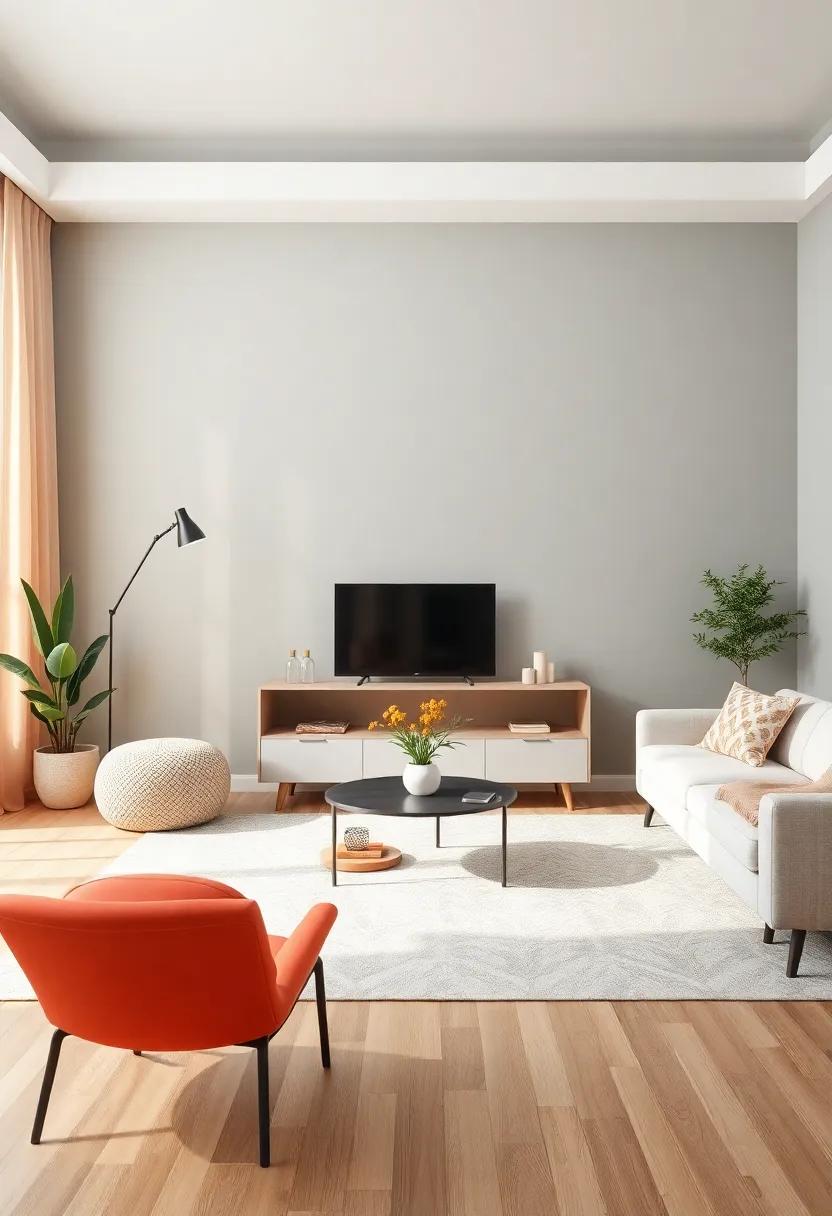
In small living rooms, color holds the remarkable power to alter perceptions of space. A minimalist color scheme, which favors a restrained palette, can evoke a sense of tranquility and openness. Consider using shades like soft whites, gentle grays, or earthy beiges that do not overwhelm the senses. These tones reflect light beautifully, creating a radiant and airy atmosphere.Incorporating slight variations of the same hue can add depth without compromising simplicity, making the area feel cohesive and inviting.
to accentuate the impact of minimalist hues, you can introduce layered textures through furniture and decor. Pairing a light-colored sofa with a woven rug adds richness,while maintaining a clean aesthetic. Additionally, you can use strategically placed pops of color, such as in cushions or artwork, to draw attention without cluttering the space. Below is a simple guide to effective accent colors:
| Accent Color | Recommended Combinations |
|---|---|
| Soft Blue | Works well with whites and grays |
| Muted Green | Pairs beautifully with beige and taupe |
| Warm Coral | Contrasts nicely with cool neutrals |
Palette Perfection: Selecting the Right Colors for Cozy Spaces
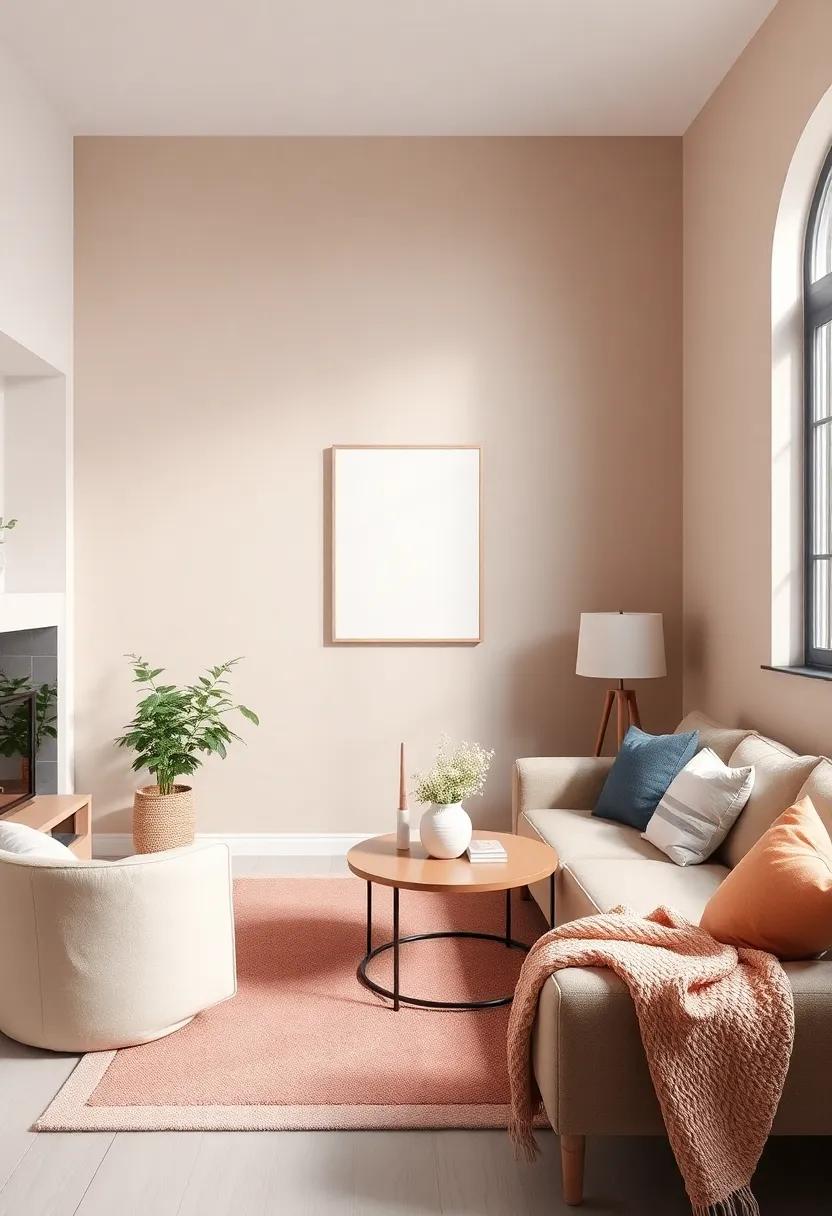
Selecting the right colors for a cozy living space involves more than just preference; it’s about creating an ambiance that feels inviting and soothing. Embracing a minimalist color scheme can maximize the warmth of a small room while maintaining an air of simplicity. Consider opting for shades that blend seamlessly, like soft whites, muted grays, and gentle pastels. These neutrals can serve as a backdrop, allowing furniture and decor to stand out without overwhelming the space. Pair these with pops of richer colors in soft furnishings or artwork to provide depth and interest.
Here are some effective color combinations to inspire your palette:
- Soft Greys and Warm Whites: Create a tranquil atmosphere that’s versatile and timeless.
- Muted Blues and Creams: Instill a sense of calm while still feeling fresh and airy.
- Dusty Rose and Light beige: Add a touch of warmth and elegance with a subdued floral hint.
- Olive green and Soft Off-Whites: Introduce a natural vibe that promotes relaxation.
To further refine your space, consider balancing larger areas of color with accessories. Below is a simple layout to help visualize how to incorporate these color themes:
| Color Scheme | Accent Elements |
|---|---|
| Soft Greys & Warm Whites | Cushions, Throws, Artwork |
| Muted Blues & Creams | Vases, Rugs, Wall Art |
| Dusty Rose & Light Beige | Picture Frames, Curtains, Small Furniture |
| Olive Green & Soft Off-whites | Plants, Table Decorations, Seat Cushions |
Natural Light and Color: Enhancing Brightness in a Small Living Room

One of the most effective ways to brighten a small living room is by harnessing the power of natural light. When possible, maximize windows by choosing light, airy window treatments that allow sunlight to filter through while maintaining privacy. This not only invites more light into the space but also creates a visual connection with the outdoors. Consider using a few reflective surfaces, such as mirrors or metallic decor, which can amplify the effects of natural light and create the illusion of a larger space.
To complement the brightness offered by sunlight, select a minimalist color palette that enhances the overall aesthetic. soft pastels or neutral hues are excellent choices for walls, furniture, and accessories, as they create a calm and inviting atmosphere. Implementing a few bold accents can further elevate the space without overwhelming it. Consider the following tips for your color scheme:
- Use white or light tones for larger surfaces.
- Incorporate textured materials in similar shades.
- Add pops of color in decorative elements.
| Color Choice | Effect on Space |
|---|---|
| Soft Blues | creates a serene atmosphere. |
| Light Grays | Offers modern elegance. |
| Warm Whites | Enhances warmth and spaciousness. |
Lush Greens: The Essence of Nature in a Minimalistic Color Scheme

Embracing the calming vibe of lush greens can elevate the essence of any small living space, transforming it into an oasis of tranquility.When incorporating shades of green through accents like cushions, wall art, or even indoor plants, you create a refreshing contrast against a minimalist backdrop. This approach offers a variety of choices to enhance your color scheme:
- Accent Walls: A deep forest green can serve as a striking backdrop to light-colored furniture.
- Decorative Elements: Subtle touches like green vases, books, or artwork provide depth.
- Textiles: Incorporate varied textures with green-toned rugs or throws to add warmth.
Beyond just aesthetics, the choice of green can have a psychological impact, promoting feelings of peace and relaxation. Complementing this color with neutral shades—like soft beiges or whites—will further enhance the minimalist theme. You can even create a simple guide to assist in selecting the perfect hues:
| Green Shade | Pair With | Vibe |
|---|---|---|
| Mint Green | Light Grey | Fresh & Inviting |
| Olive Green | Beige | Warm & Earthy |
| Emerald Green | White | Luxurious & Clean |
balancing Boldness: Accents that Make a Small Space Pop

When working with a small space, the right accents can transform simplicity into sophistication. Incorporating elements that draw the eye can create an inviting atmosphere without overwhelming the surroundings. Here are some ideas for making a statement:
- bold Artwork: A large canvas or framed prints can serve as a lovely focal point.
- Pops of color: Consider vibrant throw pillows or a uniquely designed rug to add life to neutral furnishings.
- Unique Lighting: Statement lamps or pendant lights can elevate both style and ambiance.
To maximize the impact of these accents, consider the balance of color and texture across surfaces.Strategies such as mixing smooth and textured materials can enhance visual depth without cluttering the space. A thoughtfully arranged color palette, featuring a combination of soft neutrals and striking highlights, can definately help to maintain a cohesive look. Here’s a simple reference table for effective color combinations:
| Base Color | Accent color 1 | Accent Color 2 |
|---|---|---|
| Light Grey | Mustard yellow | Teal |
| Beige | Coral | Slate Blue |
| white | Emerald Green | poppy Red |
Layered Textures: Bringing Depth to a minimalist Environment

In a minimalist environment, the addition of layered textures plays a crucial role in creating an inviting atmosphere while maintaining simplicity. By introducing contrasting materials and subtle patterns, you can elevate your space without overwhelming it.Consider incorporating elements such as:
- Soft textiles: Plush throw pillows and natural fiber rugs add warmth.
- Wood accents: A reclaimed wood coffee table or shelving unit introduces organic details.
- Glass objects: Clear or frosted vases can provide a touch of elegance.
Choosing a focused color palette allows these textures to shine while ensuring cohesion throughout the room.A balance of matte and glossy finishes can enhance the visual interest, drawing the eye to various layers within the space. to achieve the perfect blend, consider the following combinations:
| Texture | Color | Minimizing overhead |
|---|---|---|
| Velvet | Soft Grey | Elegant sofa Cushions |
| Woven Basket | Natural Beige | Artful Storage Solutions |
| Stone | Cool White | Candy Dishes or Decor Items |
Monochrome Magic: The Art of Black, White, and Grayscale Designs

In the realm of interior design,employing a monochrome palette can significantly transform your living space into an oasis of calm and sophistication. Shades of black, white, and gray come together to create a harmonious backdrop that highlights the beauty of minimalism. With this approach,every object in the room becomes an accent piece rather than a distraction,encouraging a sense of spaciousness and clarity. To enhance the effect, consider layering textures such as soft linens, polished metals, and natural woods, which add dimension without veering from the color scheme. This careful curation empowers small rooms to feel expansive, allowing natural light to bounce off surfaces and visually enlarge the space.
When designing with a grayscale theme, it’s essential to pay attention to the balance of light and dark elements. Incorporate pieces that serve a dual purpose, such as a sleek black ottoman that can function as both seating and storage. This practical and stylish approach not only adds functionality but also fosters a clutter-free environment. To aid in your design journey, here’s a simple reference table showcasing different elements you can utilize:
| Element | Usage |
|---|---|
| Black Sofa | Statement piece for seating |
| White Walls | Enhances natural light and openness |
| Gray Throw Pillows | Adds softness and comfort |
| Artistic Black and White Prints | Visual appeal and focal points |
| Natural Wood Accents | Warmth and texture to balance the scheme |
Soft Pastels: Creating a Calm Sanctuary in Compact Living Areas

In the world of compact living, soft pastels emerge as a powerful tool to foster tranquility and openness. These soothing hues—think delicate mint greens, serene lavenders, and gentle blush pinks—infuse a sense of calm while making small spaces feel larger. Utilizing these colors on walls, furnishings, and decor can create a cohesive look that not only enhances the room’s aesthetics but also promotes a peaceful atmosphere. To further amplify the soothing effect, consider incorporating a mix of materials such as light woods and soft textiles that complement the pastel tones.
When integrating soft pastels into your living area, be strategic about color placement and accentuating contrasts. A well-thought-out color palette could include:
- Wall Color: Soft lavender for a dreamy backdrop.
- Accent Furniture: Mint green sofa that pops against pastel walls.
- Decorative Elements: Blush pink cushions and throws to add warmth.
To visualize these combinations, a simple table can help outline the possibilities:
| Element | Color Choice |
|---|---|
| Walls | soft Lavender |
| Sofa | Mint Green |
| Cushions | Blush Pink |
Using these elements can help establish a cohesive and inviting sanctuary within your small living space, allowing for personal style and comfort without overwhelming the senses.
Earthy Tones: Grounding Your space with Warm Natural Hues

Incorporating earthy tones into your living room can evoke a sense of calm and grounding, providing a perfect backdrop for minimalist decor. Warm beiges, soft browns, and muted greens serve to create a cozy and inviting atmosphere, allowing for an effortless blend of simplicity and warmth. When selecting pieces for your space, consider accents in these tones to enhance the natural feel of your environment. Rich textures, such as linen or wool in these colors, can complement sleek minimalist furniture, adding depth without overwhelming the space. A well-placed rug or a few strategically chosen cushions can harmonize beautifully, inviting comfort and relaxation.
To help you visualize how earthy tones can transform your small living area, here’s a quick overview of effective pairing ideas:
| earthy Color | complementary Element | Suggested Accent |
|---|---|---|
| Soft Beige | Wood Accents | Natural Fiber Throw |
| Muted Olive Green | White Décor | Geometric Planter |
| Warm Terracotta | Metal Details | Copper Vase |
By grounding your small space with these warm hues, you can achieve a serene and cohesive look that embraces both functionality and style. The interplay of light and shadow created by different textures will enhance the perceived size of the room, offering a spacious feel that counteracts the typical constraints of limited areas.
Color Blocking: Playing with Shapes and Shades in Your Living Room
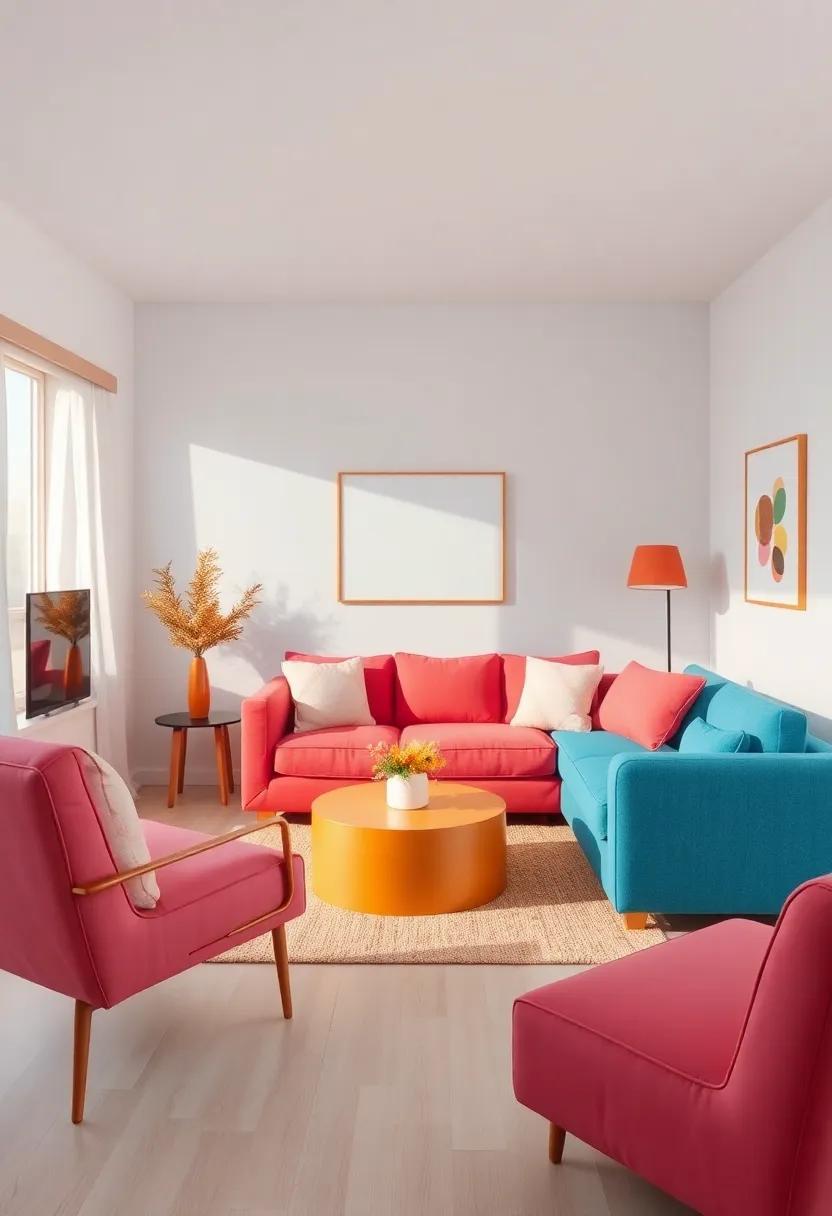
Color blocking is a vibrant technique that infuses any living room with energy and personality, especially in smaller spaces where every element counts. By strategically using contrasting hues and geometric shapes, you can create a visually dynamic environment that feels spacious and modern. Consider using a bold accent wall as a backdrop for a carefully curated selection of furniture and decor items in complementary tones. When done thoughtfully, this approach lends itself to a clean, minimalist aesthetic that draws the eye without overwhelming the senses.
To effectively utilize this technique, think about the following elements when designing your living room:
- Color Palette: Choose two or three primary colors that resonate well together.
- Shapes: Incorporate various shapes through furniture and accessories like pillows, rugs, and artwork.
- Balance: Ensure that the placement of colors and shapes creates visual balance throughout the space.
| Color | Emotion | Best Pairings |
|---|---|---|
| turquoise | Calm | Coral, White |
| Mustard Yellow | Cheerful | Teal, Gray |
| Charcoal | Elegant | Gold, Blush Pink |
The Impact of Neutrals: Timeless Elegance in small Spaces

incorporating a neutral palette into small living spaces not only enhances the sense of openness but also evokes a feeling of tranquility and sophistication. By choosing shades ranging from soft beiges and creams to deeper taupes and grays, you can create an inviting atmosphere that minimizes distractions and allows for relaxation. A well-designed space with a neutral color scheme offers adaptability, enabling you to easily switch accessories and decor elements without clashing with the backdrop. Consider featuring textured materials such as natural wood, linen, and stone to achieve visual depth while keeping the overall ambiance serene.
To further leverage the elegance of neutrals, focus on layering different tones across various elements in your living room. This approach not only adds dimension but also creates a cohesive look, keeping your space feeling uncluttered. You might consider incorporating the following design principles:
- Accent Furniture: Choose furniture pieces in varying shades of neutral to provide contrast while maintaining harmony.
- Textiles and Accessories: Utilize soft throws and cushions in muted tones to enhance comfort without overwhelming the visual space.
- Lighting: Select warm light fixtures that cast a gentle glow, complementing your neutral hues and enhancing the overall ambiance.
Furniture choices: Selecting Pieces that Embrace Minimalism

When curating a minimalist living room, every piece of furniture should serve a purpose while contributing to the aesthetic harmony of the space. Consider opting for items with clean lines and natural materials that evoke simplicity and tranquility. A well-chosen coffee table, for example, can become a focal point, blending seamlessly with the surrounding pieces. Look for designs that incorporate lightweight frames and neutral palettes, allowing them to enhance the overall spaciousness of the room.
To keep the space feeling open, aim for multifunctional furniture, such as sofas with pull-out beds or ottomans that offer storage. These choices not only reduce clutter but also maintain the minimalist ethos. When selecting color, prioritize soft tones like whites, beiges, and pastels, which reflect light and create an airy atmosphere. Here are some tips for selecting furniture that complements a minimalist style:
- Choose items that are versatile for different uses.
- Incorporate natural elements, such as wood, stone, or metal.
- Limit decorative accents and focus on quality over quantity.
Artwork that Speaks: Choosing Wall Decor to Complement a Color Scheme

When selecting wall decor, it’s essential to ensure that the artwork enhances the existing color scheme of your living room.Artworks that echo the tones and hues found in your furniture and decor not only create a harmonious environment but also draw the eye to beautiful focal points. Consider pieces that incorporate varying shades of the primary colors in your room. For example, if your space is dominated by calm blues and whites, look for artwork with subtle oceanic themes or abstract designs that feature those shades:
- Abstract prints with flowing lines
- Framed landscapes with complementary hues
- Ceramics or textiles that incorporate your color palette
Additionally, you might want to reflect on the emotions evoked by different colors when choosing your artwork. Each color carries its own psychological weight and can influence the mood of your space. A minimalist approach can be particularly effective in small areas. Embrace simple, powerful pieces that make a statement without overwhelming the senses. To help you narrow your options, consider using the following table to visualize the impact of different colors alongside potential artwork choices:
| Color | Artwork Type | emotion/Impact |
|---|---|---|
| Blue | Ocean Prints | calm and Tranquil |
| Gray | abstract Geometric | Modern and Cozy |
| Green | Botanical Illustrations | Refreshing and Invigorating |
Lighting Solutions: Illuminating Your Palette for Maximum Effect

Lighting plays a pivotal role in showcasing a minimalist color scheme effectively. By selecting the right fixtures, you can enhance the subtle hues of your space and create an inviting atmosphere. Consider these elements when planning your illumination:
- Layered Lighting: Combine ambient, task, and accent lighting to create depth and warmth.
- Color Temperature: Opt for warm white bulbs (around 2700K) to complement soft neutral tones.
- Dimmer Switches: Incorporate dimmers to adjust brightness according to mood and time of day.
Adding a touch of elegance with lighting fixtures can transform even the smallest living rooms. Pendant lights or slim-profile floor lamps can serve as focal points while illuminating the space without overwhelming it. Below is a quick comparison of popular lighting styles to enhance your minimalist aesthetic:
| Lighting Style | Description | Best For |
|---|---|---|
| Track Lighting | Versatile and adjustable, ideal for highlighting specific areas. | Artwork and furniture |
| Recessed Lighting | Flush with the ceiling, providing a clean look. | Low ceilings |
| Wall Sconces | Stylish and space-saving, perfect for narrow areas. | Accent walls |
Rug Selection: Grounding Your Space with a Thoughtful Color Choice

When grounding a small space, the right rug can serve as a pivotal anchor that elevates the overall aesthetic. Choosing colors that reflect a minimalist palette can amplify the sense of space while adding a touch of warmth. Consider opting for shades like soft beige, muted grays, or classic white.These hues not only blend seamlessly with your existing decor but also contribute to a larger, airier feel. If you wish to introduce a subtle pop of color,a soft pastel can serve as an accent without overwhelming the room. When selecting the texture, remember that a low-pile rug can help maintain visibility and light flow, making the room feel more spacious.
Additionally, the size and shape of the rug play crucial roles in defining your living space. For example, a rectangular rug can elongate the area, drawing the eye outward and enhancing the room’s dimensions. To illustrate effective rug choices, here’s a simple guide:
| rug Shape | Recommended size | Impact on Space |
|---|---|---|
| Rectangular | 5′ x 8′ | Creates an illusion of length |
| Round | 4′ or 6′ | softens angles and promotes flow |
| Runner | 2′ x 6′ | Defines pathways and adds dimension |
Ultimately, selecting a rug isn’t merely about aesthetics; it’s about curating an atmosphere that reflects simplicity and enhances your living area. By harmonizing color, size, and shape, you can create a serene retreat that feels both cozy and spacious.
Plant Life: Adding Color and Vibrancy without Clutter

Incorporating plant life into your small living space infuses a sense of vitality and warmth while maintaining a clutter-free environment. Choose minimalist planters that complement your decor, allowing foliage to become not just a decorative element, but a sculptural focal point. Consider plants with varying textures and hues to create visual interest without overwhelming your space:
- Succulents: Compact and low-maintenance,ideal for shelves or windowsills.
- Pothos: Cascading vines that add dimension and beauty from a hanging planter.
- Anthurium: Bold blooms for a pop of color that draws the eye.
- Snake Plant: Sleek and architectural, perfect for corners or side tables.
to effectively utilize plant life while minimizing clutter, consider the vertical space in your living room. Wall-mounted planters or floating shelves can create a living wall effect, drawing the eye upward and making the room feel larger. Furthermore, organizing plants into a simple grid layout can provide a structured approach to your greenery, allowing for easy care and maintenance:
| Plant Type | Light requirement | Care Level |
|---|---|---|
| Succulent | Bright, indirect light | Low |
| Pothos | Low to bright, indirect light | Easy |
| Anthurium | Bright, indirect light | Moderate |
| snake Plant | Low to bright light | Low |
Decluttering with Intention: Creating Visual harmony in Small Areas
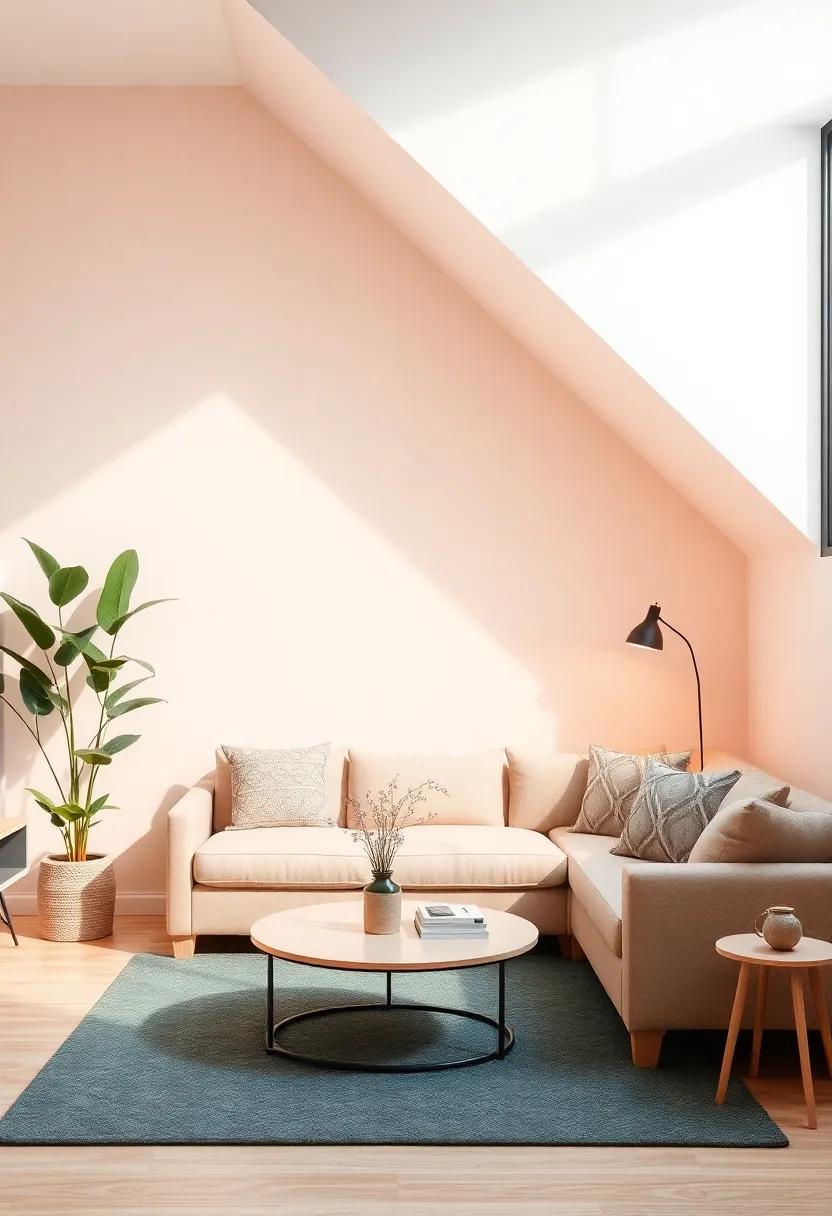
To achieve a serene and inviting atmosphere in your living room,intentional decluttering is essential. Small spaces can easily become overwhelming when filled with unused items and excessive decor. Focus on creating a calming environment by removing anything that doesn’t serve a purpose or ignite joy. Start by categorizing your belongings and follow these steps:
- Assess Each Item: Ask yourself if it contributes to the overall aesthetic or functionality.
- Limit Decorative Elements: Choose a few statement pieces over a multitude of trinkets to avoid visual chaos.
- Maximize Vertical Space: Utilize shelves and wall-mounted storage to keep floor areas clear.
Once you have streamlined your space, accentuate visual harmony with a minimalist color palette. Opt for neutral tones combined with subtle accents to enhance the perception of openness. The following table highlights some effective color combinations that promote tranquility:
| Primary color | Accent Color | Effect |
|---|---|---|
| Soft White | Pale Gray | Creates a clean, airy feel. |
| Sandy Beige | Muted Teal | Adds warmth without overwhelming. |
| Light Taupe | Subtle Rose | Infuses calmness and elegance. |
Seasonal Swaps: Refreshing Your Color Palettes Throughout the Year

Adapting your color scheme to reflect the seasons can invigorate your living space and keep it feeling fresh and inviting. As winter turns to spring, consider incorporating soft pastels like mint green or blush pink, which can uplift the mood and symbolize renewal. transition to warmer tones in summer, such as vibrant yellows and deep blues, echoing the brightness of longer days. Autumn calls for a shift towards earthier shades like burnt orange and rich burgundy, which can create a cozy atmosphere as the temperature drops.
Here are some quick tips for seasonal swaps in your living room:
- Textiles: Update throw pillows and blankets to reflect seasonal hues.
- Art Pieces: Rotate wall art that resonates with the current season’s palette.
- Accessories: Use vases and decor items in seasonal colors to add pops of interest.
- Candles: Opt for scented candles that align with seasonal aromas, swapping colors accordingly.
| Season | Color Suggestions |
|---|---|
| Spring | Soft Pastels (Mint, Blush) |
| Summer | Vibrant yellows, Deep Blues |
| Autumn | Earthy Shades (Burnt Orange, Burgundy) |
| Winter | Crisp Whites, Deep Greens |
To Wrap It Up
As we draw the curtains on our exploration of transforming small spaces through the lens of minimalist color schemes, it’s clear that a thoughtfully curated palette transcends mere aesthetics; it shapes the very atmosphere of your living room. By embracing simplicity and intentionality in color choices, you have the power to create an environment that not only feels larger but also resonates with peace and clarity. Whether you opt for soft neutrals that invite warmth or bold accents that ignite creativity, remember that every hue tells a story.
Ultimately, your living room should reflect your unique personality, all while maintaining a sense of tranquility and spaciousness. As you embark on this journey of transformation, let your color choices speak volumes in a whisper, allowing your small space to flourish into an oasis of comfort and style. Take the lessons learned here and watch as your minimalist approach does wonders,creating a harmonious sanctuary that celebrates both simplicity and elegance. Happy decorating!
As an Amazon Associate I earn from qualifying purchases.
